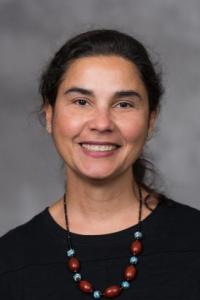
Join us on Friday, April 8th from 2:20-3:40 PM in Hagerty Hall 255 or online via Zoom for a talk by Dr. Marlyse Baptista entitled "On the emergence of Creole pronominal systems: Social and linguistic factors."
Abstract:
Pidgin and Creole languages typically emerge in multilingual settings and result from the multiple, complex social factors and linguistic processes that participate in language emergence, development and change. The original creolophones' diverse linguistic backgrounds account for the unavoidable variability in the input to Pidgins and Creoles and make it necessary to consider variation as one of their inherent attributes (Meyerhoff, 2021).
In this presentation, I first present a socio-historical overview of Upper-Guinea Creoles focusing on the original populations and languages in contact. I then discuss a range of complex processes involved in Creole genesis, includingsubstratal transfer (Siegel, 2008), restructuring (Neumann-Holzschuh & Schneider, 2000) feature recombinations (DeGraff, 1999; Mufwene, 2001; Aboh, 2015), and focus more particularly on language convergence.
Using the Pattern and Matter Mapping model or PMM (Baptista, 2020), I examine diachronic (Schuchardt, 1880) and synchronic data that compare the pronominal system of Upper Guinea Creoles' diverse source languages on both the African (Wolof and Mandinka) and European (Portuguese) sides to those Creoles today. A careful comparative analysis of the forms, functions and distribution of the pronouns (featuring both atonic single subject pronouns and double tonic/atonic subject pronouns) in the source languages will reveal 1) the precise connections between them and the resulting Creoles, 2) to what extent the observable properties overlap or converge in the languages in contact and 3) to what extent they diverge and innovate.
The same complex process of convergence will be shown to occur in a variety of other contact situations involving Spanish-lexified Creoles like Palenquero.
In light of the complex picture of Creole emergence drawn by this presentation, I and my research group at the University of Michigan make a call for drastic changes in the way that Creoles are discussed and introduced to students of Linguistics, Anthropology, Psychology and other fields (*Bancu, *Peltier et al., submitted). I discuss preconceived notions about Creoles that are inherited from the colonial times in which they emerged, perpetuated by current neo-colonial distorted narratives (DeGraff, 2003) and make a set of recommendations for their study, based on *Bancu, *Peltier et al. (submitted).
Speaker Bio:

Dr. Marlyse Baptista is a contact linguist and morphosyntactician specialized in Pidgin and Creole languages (and their source languages), and in theories of language emergence, language contact and change.
She has a particular interest in cognition and theoretical models of language contact & language emergence. With collaborators, she uses experimental methods (involving artificial language learning) investigating how languages and their speakers converge, diverge and innovate in multilingual settings. She also uses fieldwork data and tools from Generative Syntax to study the grammatical properties of Pidgins and Creoles.
Her current research investigates the cognitive processes involved in contact situations and focuses on the role of convergence in L2 acquisition (Baptista, Gelman & Beck, 2016), bilingualism and creole genesis and development (Baptista, 2006; 2020).
She directs the Cognition, Convergence and Language Emergence (CCLE) Research Group in the Department of Linguistics at the University of Michigan. She is also core faculty in The Weinberg Institute for Cognitive Science and affiliated faculty in the Department of Afroamerican and African Studies at the University of Michigan.
